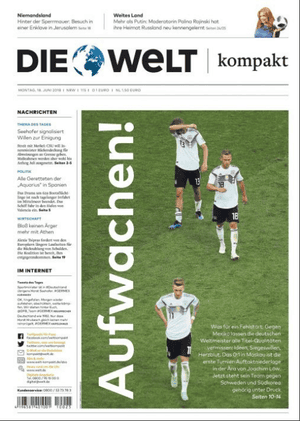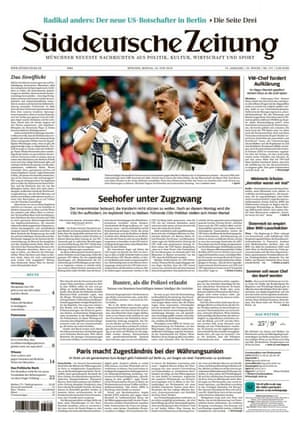Even before Sunday’s sobering start for the titleholders, the World Cup had kicked off on a somewhat unenthusiastic note, the usual euphoria dampened by a debate about national identity and belonging, triggered by midfielders Mesut Özil and İlkay Gündoğan’s decision to pose for a photograph with Turkey’s strongman president.
But if few have dared predict that Germany could become the first world champions to defend their title since Brazil in 1962, expectations were set for nothing but a routine win in the opening game. “Sorry Mexico, today WE build a wall”, ran Welt am Sonntag’s headline on Sunday, and Bild had offered “Nine reasons for a 3-0 against Mexico”.
Even the head coach, Joachim “Jogi” Löw, had apparently already focused on the knockout phase, with the Dortmund winger Marco Reus blabbing in a post-match interview that he had been rested in the opener “because we expect the tournament to go on for a long time”.

Monday’s headlines speak of mental discombobulation: “Nightmare at kick-off” (Berliner Zeitung), “Fiasco instead of fiesta: Die Mannschaft has lost its World Cup shine” (Morgenpost), “Wake up!” (Die Welt).

“In the past months there has been a lot of talk about boycotting the World Cup for political reasons”, wrote commentator Matthias Brügelmann in tabloid Bild. “But I did not expect that Jogi’s boys would turn that into practice on the pitch in their opener, of all matches.”

The broadsheet Süddeutsche Zeitung takes a more sociological approach, glimpsing in Germany’s performance a reflection of the country’s changing demographic. “If sociologists are right, then Germany faces a problem with an ageing society”, writes reporter Philipp Selldorf. “On Sunday evening in Moscow it looked like the sociologists could be proven right earlier than they themselves predicted.”
Germany looked “old and heavy and exhausted”, and once youthful players such as Mesut Özil, Thomas Müller and Sami Khedira moved their bodies “as if they had finished a very, very exhausting season only yesterday”.
Watching Germany’s first 11 slowly traipse off the pitch at half-time, Selldorf even wonders “if the stadium was witnessing the end of an era”.
Talking of end of eras, commentators for Der Spiegel cannot help but draw parallels between Germany’s disjointed performance and Angela Merkel’s struggle to keep together a fraying coalition government.
In a feature published at the weekend, the magazine notes that Löw and Merkel were put in charge of organisations in the middle of a crisis: the chancellor’s Christian Democratic Union had been hit by a donations scandal, while the German FA was struggling to keep up with talent factories in France and the Netherlands.
During their tenure, Spiegel notes, Löw and Merkel have proved apt managers while also profiting from the reformist zeal of their predecessors and a general surplus of wealth and talent. “They don’t make big mistakes, but they also don’t risk a lot”, wrote journalist Markus Feldenkirchen.
Speaking in a press conference after the Mexico match, Löw appeared willing to invite further comparison, his words “wir werden das schaffen” (we will manage) echoing Merkel’s much-quoted remarks at the height of the 2015 refugee crisis: “wir schaffen das”.
“Considering the team’s performance against Mexico,” noted Spiegel wryly on Monday, “there are reasons to doubt that.”